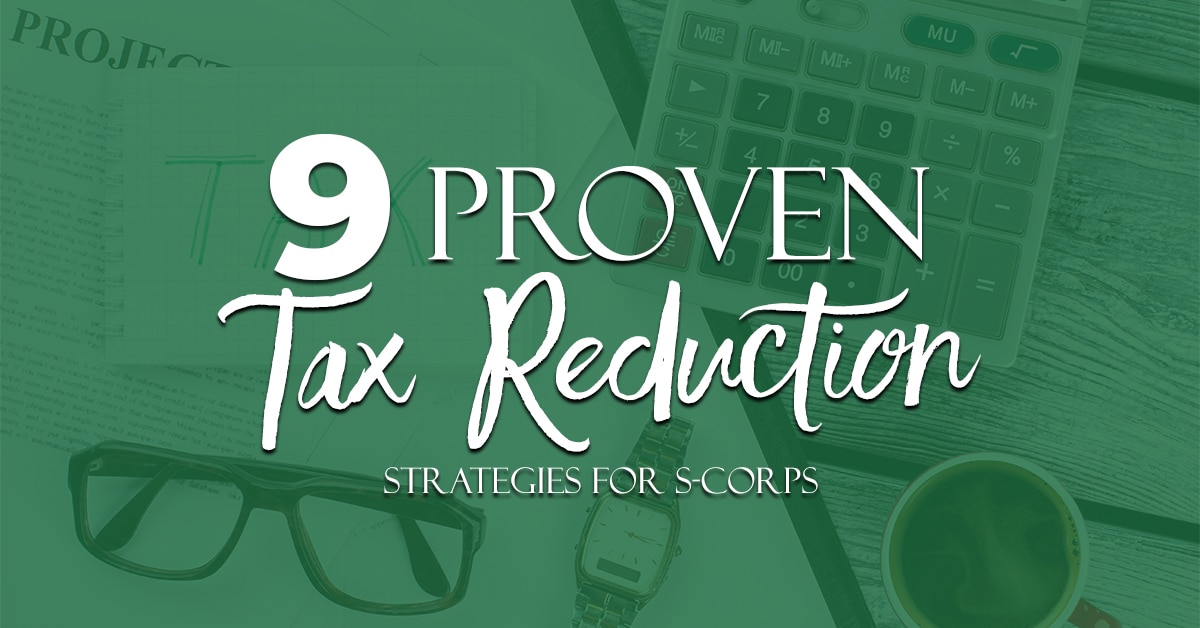Irrespective of the nature of business or enterprise you run today, you are most likely constantly looking for ways to reduce your tax burden. It only makes sense—after all, we all want to save some of our income wherever we can, right? Indeed, you may have started earning so much money, and your business is expanding so quickly that it’s time to hire someone to keep a record of it.
Let’s look at and discuss nine proven tax reduction strategies for S-corps
S-Corps Owners’ Wages Should Be Reduced
S-corps owners can save anything from $8,000 – $20,000 per year on personal payroll taxes by simply reducing their exorbitant wages. By reducing your salary, the owner can take their leftover S-corps earnings as distributions, which are not susceptible to self-employment tax. You can legitimately cut taxes as the owner of an S-Corps. You can save a significant amount of money in payroll taxes by paying yourself a lower salary. However, it would be best if you did not drop your income to less than what the IRS considers “reasonable” compensation.
The S-Corps Should Pay For the Owner’s Health Insurance Premiums
The S-Corps can set up a health insurance plan for its employees. Most business owners are unaware that you must route it through your S-corps to deduct health insurance. That said, an S-corps can incorporate a health care plan for its owner or employee who owns more than 2% of the company in one of two ways:
- the S-corps pays the premium for the owner or family, or
- the S-corp reimburses the owner for the premiums looks.
The S-Corps is responsible for paying the premiums for the owner-employee and family or returns the dividends to the owner-employee. It’s worth noting that if you and your partner are qualified for health insurance through your spouse’s employer, you cannot take this deduction. Furthermore, your insurance premiums cannot surpass your S-corps salary.
Depreciation Expenditures Reimbursement
The S-Corps has the authority to refund the S-Corps’ owner for expenditures for depreciation (as well as Section 179 expenses) associated with the use of a vehicle for business purposes, a home office, or other assets. This is a tax-free discount of the S-Corps profit for the owner. In addition to the vehicle deductions, an eligible “heavy” vehicle (over 6,000 pounds) utilized for about 50% of all commercial purposes can generate a Section 179 first-year depreciation deduction. It is critical to recognize that the Section 179 deduction cannot outpace the average net business taxable income from all sources measured before the Section 179 write-off for that year.
Travel Expenses Reimbursement
Let’s take a look at how an accountable strategy can enable you to get back much more than your home office. If you pay for expenses accrued from your business out of pocket rather than through your company, your corporation could pay you back under the accountable-plan guidelines. According to these rules, as the owner, you must accumulate these expenditures in the performance of your responsibilities for the corporation and corroborate the costs to the corporation in full compliance with IRS conditions.
Rent Out Your Residence to Your S-Corps
An S-Corps owner can rent out their home to the S-Corps for up to 14 non-consecutive days per year and receive significant tax benefits. The S-Corps deducts the entire cost of the rent, and the owner benefits from tax-free income.
Hiring Your Child
The S-Corps owner is obligated to pay payroll taxes on the child’s salary, but the family benefits from a reduction in income taxes mean each child can earn up to $12,950 each year without needing to pay Federal income taxes.
Cell Phone Expenses Reimbursement
Smartphones are critical tools for your job as a professional. When an S-corps provides its staff with a smartphone or device essentially needed for non-compensatory business purposes, it may be exempt from income. According to the IRS audit manual on this subject, reimbursements are not income if the staff’s month-to-month coverage is sensible, the reimbursement does not surpass the exact cost racked up, and the reimbursement is not an alternative for the staff’s standard pay.
Investing in Your Retirement
As most of you seem to be aware, contributing your pre-tax retirement funds can save you a lot of money in taxes. Your retirement funds are deducted from each paycheque before taxes are deducted as a worker engaging in a tax-deferred retirement plan (such as a 401(k), SEP, SIMPLE, or pension plan). Even though pre-tax contributions are made, your taxable income is reduced, leading to fewer taxes paid ultimately.
Deduction for Home Office Expenses
Traditional tax-deduction techniques always include searching for personal costs that can be subtracted from business earnings. The same is true for S-corps. When the S-corps refunds the owner for home office expenditures, the refund is a tax deduction for the S-corp. What was the result? A portion of the owner’s living costs gets to be tax-free.
As the New Year fully kicks off, now is the best time to consider ways to minimize your tax burden. In most cases, the implementation of these tax strategies requires some extra due diligence and guidance of a professional. If these are implemented incorrectly, there can be significant negative tax consequences. This is why it might be the time to outsource a Certified Public Accountant (CPA) like the professionals at Tracy Jones CPA.
Enlisting a CPA to do your taxes can save you considerable time and anguish. It also allows you to save money to help you identify deductions and credits that you were unaware of. We all know that tax preparation is complex – and it’s likely to remain so.
It is possible to decrease your S-corps tax burden for 2022 with just a little perseverance, appropriate documentation, and outsourcing to the right CPA.







